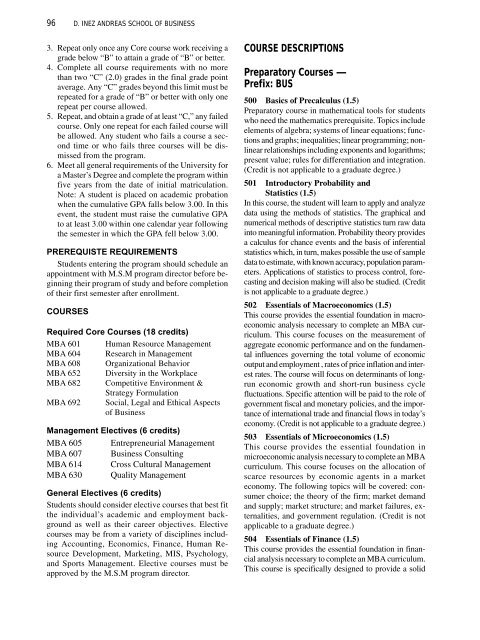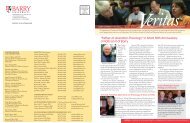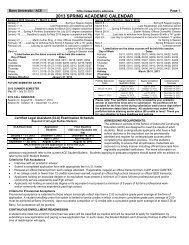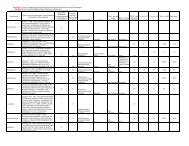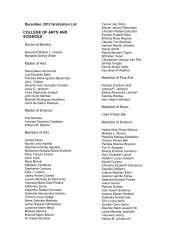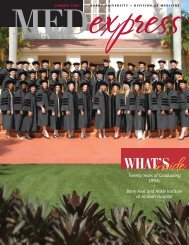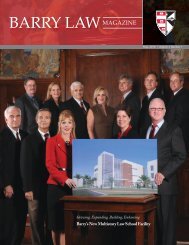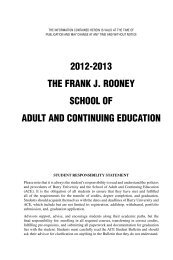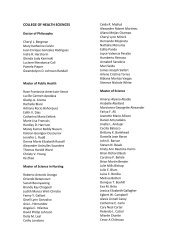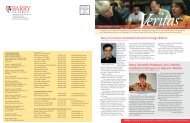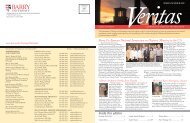2004-2005 - Barry University
2004-2005 - Barry University
2004-2005 - Barry University
Create successful ePaper yourself
Turn your PDF publications into a flip-book with our unique Google optimized e-Paper software.
96 D. INEZ ANDREAS SCHOOL OF BUSINESS<br />
3. Repeat only once any Core course work receiving a<br />
grade below “B” to attain a grade of “B” or better.<br />
4. Complete all course requirements with no more<br />
than two “C” (2.0) grades in the final grade point<br />
average. Any “C” grades beyond this limit must be<br />
repeated for a grade of “B” or better with only one<br />
repeat per course allowed.<br />
5. Repeat, and obtain a grade of at least “C,” any failed<br />
course. Only one repeat for each failed course will<br />
be allowed. Any student who fails a course a second<br />
time or who fails three courses will be dismissed<br />
from the program.<br />
6. Meet all general requirements of the <strong>University</strong> for<br />
a Master’s Degree and complete the program within<br />
five years from the date of initial matriculation.<br />
Note: A student is placed on academic probation<br />
when the cumulative GPA falls below 3.00. In this<br />
event, the student must raise the cumulative GPA<br />
to at least 3.00 within one calendar year following<br />
the semester in which the GPA fell below 3.00.<br />
PREREQUISTE REQUIREMENTS<br />
Students entering the program should schedule an<br />
appointment with M.S.M program director before beginning<br />
their program of study and before completion<br />
of their first semester after enrollment.<br />
COURSES<br />
Required Core Courses (18 credits)<br />
MBA 601 Human Resource Management<br />
MBA 604 Research in Management<br />
MBA 608 Organizational Behavior<br />
MBA 652 Diversity in the Workplace<br />
MBA 682 Competitive Environment &<br />
Strategy Formulation<br />
MBA 692 Social, Legal and Ethical Aspects<br />
of Business<br />
Management Electives (6 credits)<br />
MBA 605 Entrepreneurial Management<br />
MBA 607 Business Consulting<br />
MBA 614 Cross Cultural Management<br />
MBA 630 Quality Management<br />
General Electives (6 credits)<br />
Students should consider elective courses that best fit<br />
the individual’s academic and employment background<br />
as well as their career objectives. Elective<br />
courses may be from a variety of disciplines including<br />
Accounting, Economics, Finance, Human Resource<br />
Development, Marketing, MIS, Psychology,<br />
and Sports Management. Elective courses must be<br />
approved by the M.S.M program director.<br />
COURSE DESCRIPTIONS<br />
Preparatory Courses —<br />
Prefix: BUS<br />
500 Basics of Precalculus (1.5)<br />
Preparatory course in mathematical tools for students<br />
who need the mathematics prerequisite. Topics include<br />
elements of algebra; systems of linear equations; functions<br />
and graphs; inequalities; linear programming; nonlinear<br />
relationships including exponents and logarithms;<br />
present value; rules for differentiation and integration.<br />
(Credit is not applicable to a graduate degree.)<br />
501 Introductory Probability and<br />
Statistics (1.5)<br />
In this course, the student will learn to apply and analyze<br />
data using the methods of statistics. The graphical and<br />
numerical methods of descriptive statistics turn raw data<br />
into meaningful information. Probability theory provides<br />
a calculus for chance events and the basis of inferential<br />
statistics which, in turn, makes possible the use of sample<br />
data to estimate, with known accuracy, population parameters.<br />
Applications of statistics to process control, forecasting<br />
and decision making will also be studied. (Credit<br />
is not applicable to a graduate degree.)<br />
502 Essentials of Macroeconomics (1.5)<br />
This course provides the essential foundation in macroeconomic<br />
analysis necessary to complete an MBA curriculum.<br />
This course focuses on the measurement of<br />
aggregate economic performance and on the fundamental<br />
influences governing the total volume of economic<br />
output and employment , rates of price inflation and interest<br />
rates. The course will focus on determinants of longrun<br />
economic growth and short-run business cycle<br />
fluctuations. Specific attention will be paid to the role of<br />
government fiscal and monetary policies, and the importance<br />
of international trade and financial flows in today’s<br />
economy. (Credit is not applicable to a graduate degree.)<br />
503 Essentials of Microeconomics (1.5)<br />
This course provides the essential foundation in<br />
microeconomic analysis necessary to complete an MBA<br />
curriculum. This course focuses on the allocation of<br />
scarce resources by economic agents in a market<br />
economy. The following topics will be covered: consumer<br />
choice; the theory of the firm; market demand<br />
and supply; market structure; and market failures, externalities,<br />
and government regulation. (Credit is not<br />
applicable to a graduate degree.)<br />
504 Essentials of Finance (1.5)<br />
This course provides the essential foundation in financial<br />
analysis necessary to complete an MBA curriculum.<br />
This course is specifically designed to provide a solid


